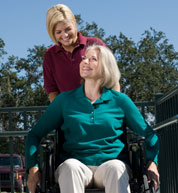 |
| Mrs P thanks God for her recovery from a tragic accident |
This one’s been in the news a bit recently – a study apparently showing that religion helps accident victims recover from brain trauma. You can read essentially the same report on lots of outlets – basically it’s a straight dump of the press release.
So here’s what they did. They took 88 adults who had had a serious brain injury sometime in the past 20 years, and they asked a friend or relative to fill out a standard questionnaire on how well they can perform normal daily activities, like dressing or meeting with friends.
They also asked them about their ‘Religious Well-being’. This is a questionnaire that asks them how much they agree with statements like “I have a personally meaningful relationship with God” and “I believe that God is concerned about my problems”.
Well, the headline news is that the higher they rated their religious well-being, the more likely their friend/relative was to say that they were functional. And so, conclude the authors:
Feeling supported by a higher power likely enhances positive outcomes in part through the mechanism of enhancing feelings of general support.
But hold on a moment here! Isn’t there the little problem of timing? Brain injury occurs some time in the past (10 years on average), and now they ask whether the individual thinks that god loves them? Should we be surprised that the ones who have the worst disability also feel the most abandoned by their god?
In fact, this is such an obvious interpretation of these data that I’m surprised they don’t mention it in the paper. Still, it all goes to show that you should take press releases with a pinch of salt!
Waldron-Perrine B, Rapport LJ, Hanks RA, Lumley M, Meachen SJ, & Hubbarth P (2011). Religion and spirituality in rehabilitation outcomes among individuals with traumatic brain injury. Rehabilitation psychology, 56 (2), 107-16 PMID: 21574729
 This article by Tom Rees was first published on Epiphenom. It is licensed under Creative Commons.
This article by Tom Rees was first published on Epiphenom. It is licensed under Creative Commons.













